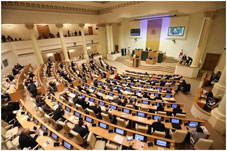
Parliament approves 6 Supreme Court judges
By Khatia Bzhalava
Tuesday, July 13
Yesterday, during an extraordinary session Georgian parliament appointed six out of nine judges selected by the High Council of Justice to the country’s Supreme Court. The elected judges are Gocha Abuseridze (79 in favour, 5 against), Giorgi Gogiashvili (79 in favour, 4 against), Levan Tevzadze (77 in favour, 6 against), Revaz Nadaraia (77 in favour, 6 against), Bidzina Sturua (78 in favour, 6 against) and Lasha Kochiashvili (79 in favour, 5 against). The non-governmental sector considers these candidates as part of the so-called ‘clan of judges’ in Georgia’s judiciary. Three candidates, Eka Zarnadze, Ketevan Meskhishvili and Giorgi Shavliashvili, failed to get enough votes.
Part of the parliamentary opposition and the Public Defender's Office boycotted the interview process of the nine candidates. According to the Public Defender Nino Lomjaria, the selection process was a ‘farce’ and there was no point in participating in it. As Lomjaria remarked, the candidates that were the most qualified were turned down.
The international community, opposition parties, NGOs have called on the ruling party numerous times to suspend the process in compliance with the EU-mediated agreement. US Ambassador to Georgia Kelly Degnan urged the Georgian government in June to halt the appointment of judges to the Supreme Court until fundamental reforms are implemented in the judiciary.
The extraordinary session was delayed as some media executives, including director of TV Pirveli Vato Tsereteli, civil society and opposition groups broke into the parliamentary session hall, took the speaker's seat and hung the Georgian and EU flags from the tribune. They demanded the resignation of the Government, following the death of Aleksandre Lashkarava, a TV Pirveli cameraman who was brutally assaulted by radical groups at the Tbilisi Pride March counter-rally. Verbal as well as physical confrontation took place in the plenary hall.
Only three opposition parties attended the extraordinary session, with only six of 66 MPs casting their votes.


